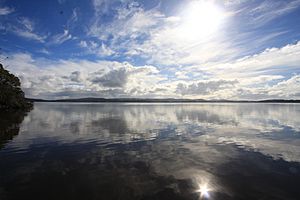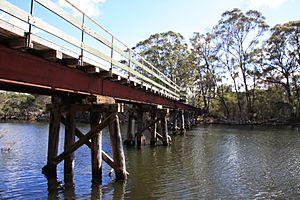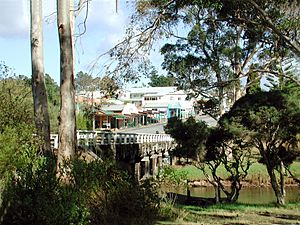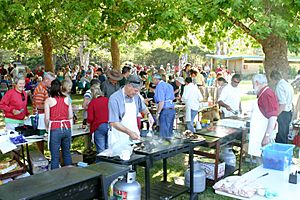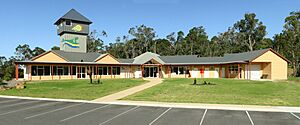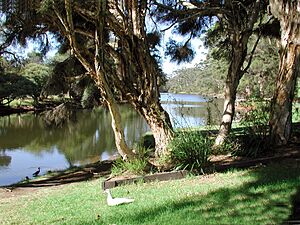Denmark, Western Australia facts for kids
Quick facts for kids DenmarkWestern Australia |
|||||||||||||||
|---|---|---|---|---|---|---|---|---|---|---|---|---|---|---|---|
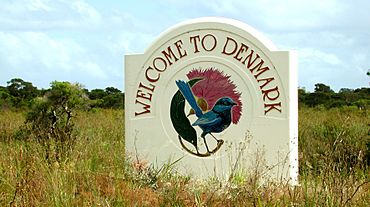
Denmark, Western Australia
|
|||||||||||||||
| Established | 1895 | ||||||||||||||
| Postcode(s) | 6333 | ||||||||||||||
| Area | [convert: needs a number] | ||||||||||||||
| LGA(s) | Shire of Denmark | ||||||||||||||
| State electorate(s) | Warren-Blackwood | ||||||||||||||
| Federal Division(s) | O'Connor | ||||||||||||||
|
|||||||||||||||
|
|||||||||||||||
Denmark is a beautiful coastal town in Western Australia. It's located on the Wilson Inlet, about 423 kilometers (263 miles) south-east of Perth, the state capital. In 2016, about 2,558 people lived there. However, during holidays, many more visitors come to enjoy the town!
Contents
Discovering Denmark's Past
Early European Sightings
The area around Denmark was first called 't Landt van de Leeuwin by Dutch explorers. This name means "Leeuwin's Land." It was named after a Dutch ship called the Leeuwin, which saw the coast in 1622. Another Dutch captain, François Thijssen, explored this coastline in 1627. His ship, The Golden Seahorse, sailed far along the southern coast of Australia.
Noongar People and the Kwoorabup River
For thousands of years before Europeans arrived, the Noongar people lived in this area. They are the traditional owners of the land. They called the river and the inlet Kwoorabup. This name means "place of the black wallaby."
How Denmark Got Its Name
In 1829, a naval surgeon named Thomas Braidwood Wilson explored the river. He was with a Noongar man named Mokare and other companions. Wilson named the river after his mentor, Alexander Denmark, who was also a naval surgeon. This is how the Denmark River got its modern name.
Timber Industry and Early Growth
In 1895, a company bought a large area of timber land at the Denmark River. They built a railway line and timber mills. By 1900, about 2,000 people lived in Denmark, mostly workers and their families.
Challenges and New Beginnings
However, the timber industry soon ran out of trees. By 1904, the mills closed down. The population dropped a lot. The town started to grow again in the 1920s with a plan to create small farms. People started dairy farming and growing fruit, especially apples.
Tourism and Wine Industry
Tourism began to grow after World War II, when American soldiers visited Denmark. After the war, it became a popular holiday spot. By the 1960s, more people moved to Denmark, including those looking for a different lifestyle.
Farmers also discovered that the rich soil was perfect for growing grapes. The first winery opened in 1976. Today, Denmark is known for its excellent wines and is part of the Great Southern Wine Region.
Denmark's Climate
Denmark has a Mediterranean climate. This means it has warm, dry summers and mild, wet winters. It's a great place to visit year-round!
| Climate data for Denmark, Western Australia | |||||||||||||
|---|---|---|---|---|---|---|---|---|---|---|---|---|---|
| Month | Jan | Feb | Mar | Apr | May | Jun | Jul | Aug | Sep | Oct | Nov | Dec | Year |
| Record high °C (°F) | 43.9 (111.0) |
40.5 (104.9) |
40.3 (104.5) |
37.2 (99.0) |
30.6 (87.1) |
26.1 (79.0) |
22.5 (72.5) |
25.0 (77.0) |
27.0 (80.6) |
32.8 (91.0) |
36.0 (96.8) |
39.5 (103.1) |
43.9 (111.0) |
| Mean daily maximum °C (°F) | 25.9 (78.6) |
25.3 (77.5) |
24.5 (76.1) |
21.6 (70.9) |
19.0 (66.2) |
16.8 (62.2) |
16.1 (61.0) |
16.4 (61.5) |
17.5 (63.5) |
19.1 (66.4) |
21.0 (69.8) |
23.2 (73.8) |
20.5 (68.9) |
| Mean daily minimum °C (°F) | 13.0 (55.4) |
13.5 (56.3) |
12.2 (54.0) |
10.4 (50.7) |
8.9 (48.0) |
7.6 (45.7) |
6.9 (44.4) |
6.9 (44.4) |
7.5 (45.5) |
8.7 (47.7) |
10.5 (50.9) |
11.8 (53.2) |
9.8 (49.6) |
| Record low °C (°F) | 4.5 (40.1) |
4.4 (39.9) |
2.0 (35.6) |
2.0 (35.6) |
0.0 (32.0) |
−1.4 (29.5) |
−0.3 (31.5) |
−1.7 (28.9) |
−0.4 (31.3) |
1.5 (34.7) |
2.5 (36.5) |
2.8 (37.0) |
−1.7 (28.9) |
| Average rainfall mm (inches) | 22.3 (0.88) |
27.3 (1.07) |
38.1 (1.50) |
81.9 (3.22) |
124.7 (4.91) |
143.0 (5.63) |
158.9 (6.26) |
127.8 (5.03) |
99.1 (3.90) |
92.1 (3.63) |
53.0 (2.09) |
32.0 (1.26) |
995.9 (39.21) |
| Average rainy days (≥ 0.2 mm) | 7.3 | 8.5 | 10.3 | 15.0 | 19.4 | 21.6 | 23.3 | 22.0 | 19.6 | 17.1 | 13.1 | 9.7 | 186.9 |
| Mean monthly sunshine hours | 257.3 | 198.8 | 192.2 | 144.0 | 139.5 | 126.0 | 137.8 | 155.0 | 159.0 | 198.4 | 195.0 | 251.1 | 2,154.1 |
| Source: Bureau of Meteorology | |||||||||||||
People and Community
In 2016, Denmark had a population of 2,558 people. Most residents were born in Australia. Many others came from England, Scotland, New Zealand, and South Africa. About 2.1% of the population identified as Aboriginal.
The number of people in Denmark changes a lot with tourism. During school holidays and summer, the town is often full of visitors. Many holiday homes in Denmark belong to families from Perth.
Things to Do and See
Denmark is a rural town with several important industries. These include timber milling, fruit growing, and farming beef cattle and dairy cows. The wine industry is also very important. Tourism is the fastest-growing business in Denmark.
The town is home to the Western Australian College of Agriculture – Denmark. This is a working farm and school for students in Years 10, 11, and 12. They learn about farming and related studies. Denmark also has a Senior High School.
In 1998, Denmark was named "Australia's Tidiest Town."
You can find a wooden Heritage Railway bridge near the Denmark River and Wilson Inlet. This bridge is now a footbridge. Several walking trails meet here, including the famous Bibbulmun Track. This long trail goes all the way from Perth to Albany. There's also the "Denmark–Nornalup Heritage Trail."
Denmark is located on the South Coast Highway. You can also get there by public transport. The town has a small airstrip for planes.
Nature and Wildlife
Denmark is surrounded by beautiful native forests. You can see many types of trees, including huge karri and jarrah trees. The red tingle tree is special to this area and can grow up to 60 meters (nearly 200 feet) tall! You might also spot the red-flowering gum, a distinctive local tree.
The area is home to many native birds. Look out for splendid fairy-wrens, emus, and Australian magpies. You might also see reptiles like snakes and skinks. Marsupials like western grey kangaroos, bandicoots, and possums also live here.
The waters around Denmark are full of fish, squid, and other marine life. This attracts bottlenose dolphins and seals. If you visit at the right time of year, you might even see southern right whales resting during their long journey north.
Greens Pool is a popular spot near Denmark. It's a sandy white beach surrounded by large granite boulders. It's part of William Bay National Park and is a major tourist attraction, especially in summer.
Denmark is also a great place for fishing. You can catch different types of fish like snapper, salmon, and bream.
Famous People from Denmark
- Emma Booth – a well-known actress, grew up in Denmark.
- Joel Hamling – a footballer for the Fremantle Dockers, was born in Denmark.
- Luc Longley – a former basketball player in the American National Basketball Association, lives in Denmark with his wife, musician and chef Anna Gare.
See also
 In Spanish: Denmark (Australia Occidental) para niños
In Spanish: Denmark (Australia Occidental) para niños



